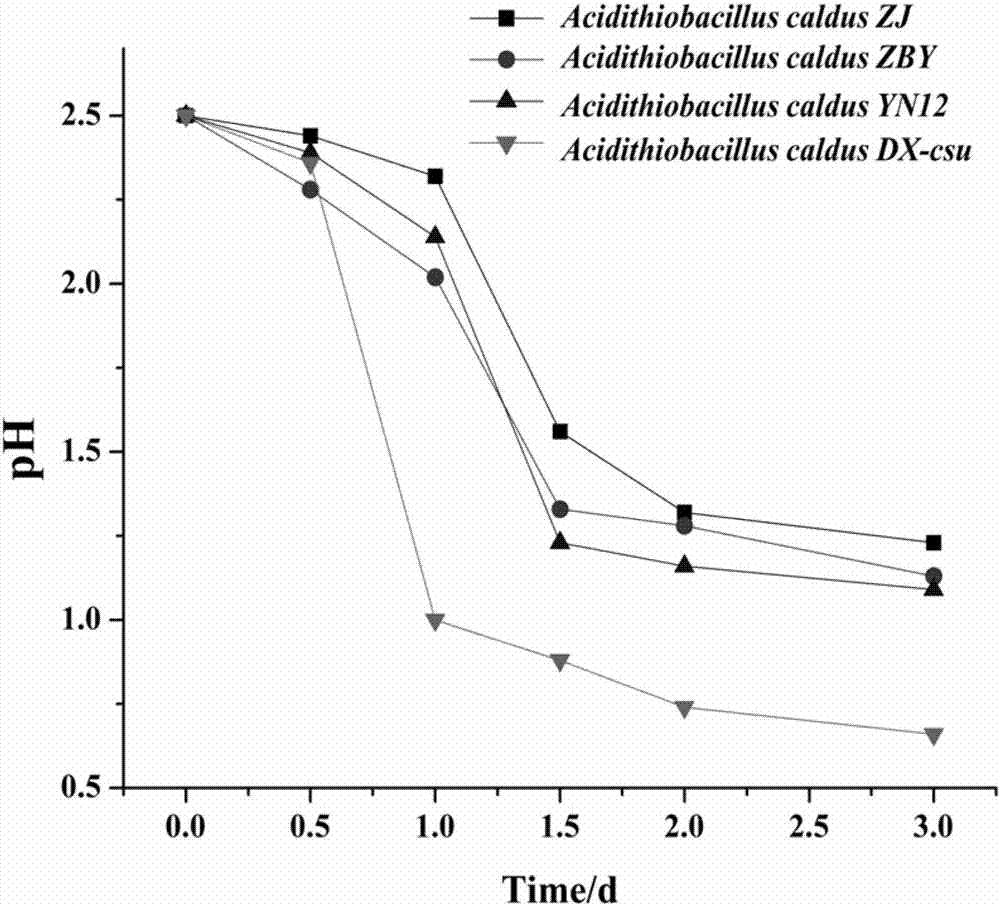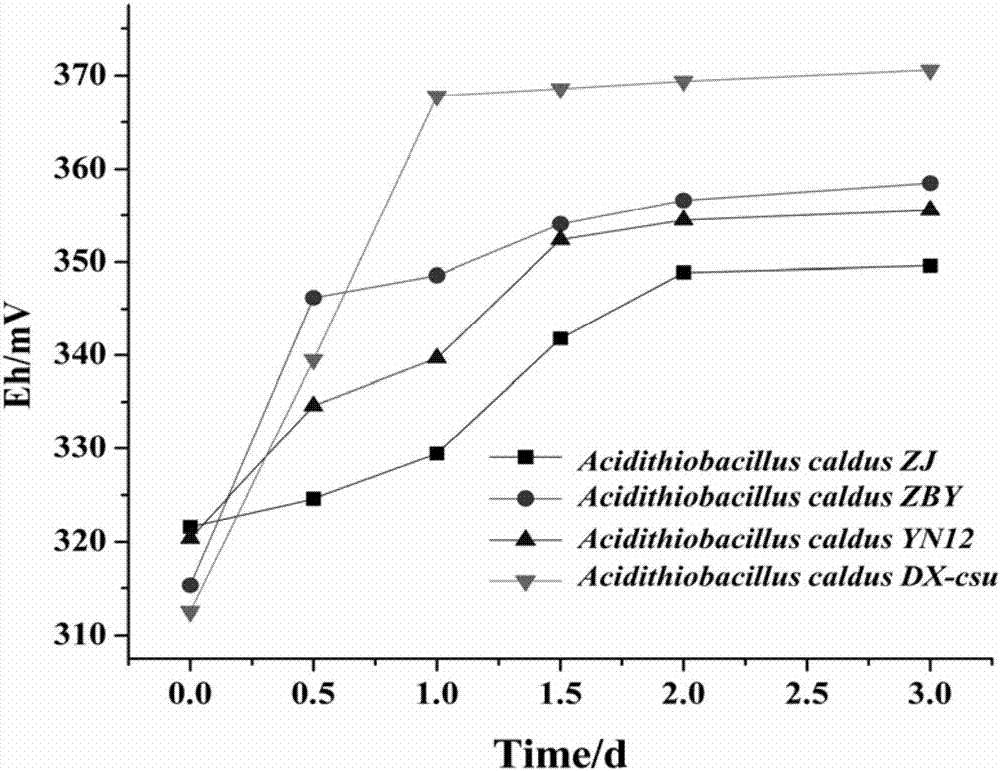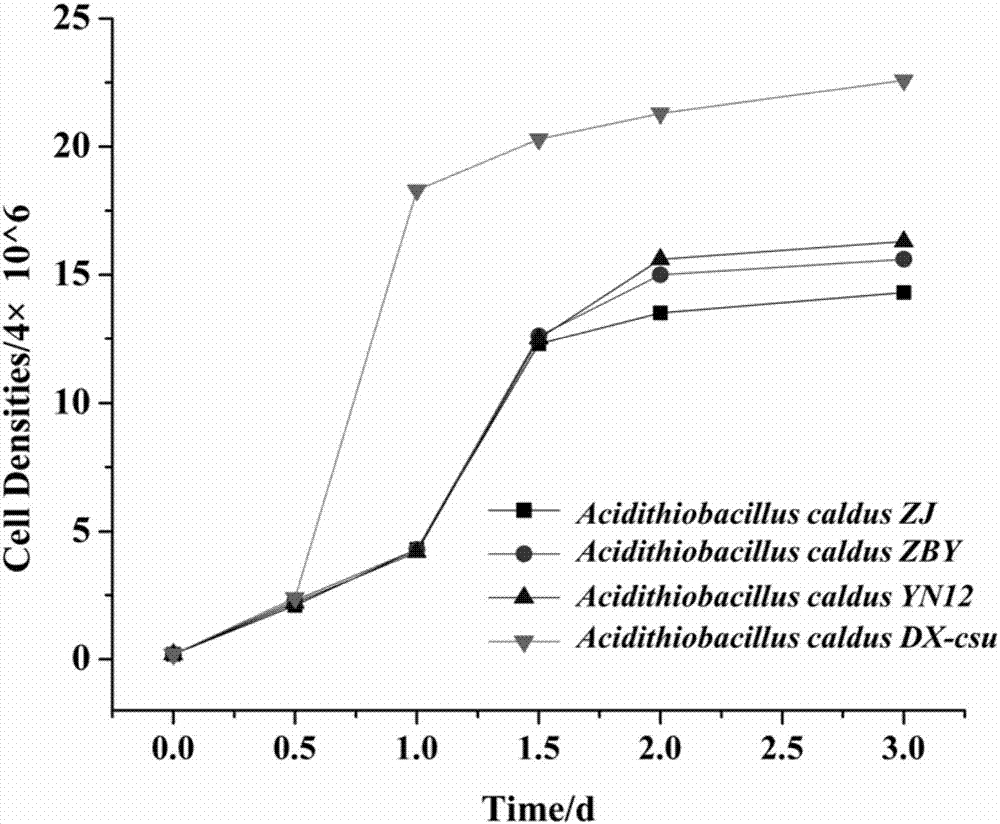Application of acidithiobacillus caldus
A technology of rod-shaped bacteria and strains, applied in the field of application of new strains of Thiobacillus thermophilicum, can solve problems such as excessive heavy metal content and endogenous soil pollution, and achieve strong acid production capacity, high biotransformation efficiency, and growth quick effect
- Summary
- Abstract
- Description
- Claims
- Application Information
AI Technical Summary
Problems solved by technology
Method used
Image
Examples
Embodiment 1
[0029] Embodiment 1, the isolation of thermophilic acid sulfur bacillus (Acidithiobacillus caldusDX-csu)
[0030] Isolation of Acidithiobacillus caldusDX-csu Collect 10g of ore sample from the ore in Dexing, add it to a conical flask containing 100ml of sterile water and glass beads, shake it on a shaker at 170r / min for 20min, and take 1ml Add 9ml of sterile water, successively dilute 10 -5 , 10 -6 , 10 -7 , 10 -8 , 10 -9 , 10 -10 times, take 1ml of the above suspension and add it to 100ml sterilized 9K medium, repeat each concentration 3 times, place it in a 45°C incubator for 0.5d, 1d and 3d, repeat the above steps 4-5 times for bacteria for separation and purification.
Embodiment 2
[0031] Embodiment 2, identification of thermophilic acid sulfur bacillus (Acidithiobacillus caldusDX-csu)
[0032] (1) The sequencing results of the 16SrRNA gene sequence of the Acidithiobacillus caldus DX-csu strain showed that the 16SrRNA gene sequence of the Acidithiobacillus caldus DX-csu strain was shown in the sequence table, and the homology comparison was performed with the 16SrRNA gene sequence of Thermophilic acidsulfobacillus in Genbank according to the sequencing results , the results showed that Acidithiobacillus caldus DX-csu belongs to thermophilic acid sulfur bacillus.
[0033] (2) The sequencing results of the whole genome gene sequence of the Acidithiobacillus caldusDX-csu strain showed that the sequence results of the whole genome of the Acidithiobacillus caldusDX-csu strain were homologously compared with the whole gene sequence of Acidithiobacillus caldusDX- csu is a new strain.
Embodiment 3
[0034] Embodiment 3, the physiological property of thermophilic acid sulfur bacillus (Acidithiobacillus caldus)
[0035] Four different kinds of thermophilic acid sulfur bacillus (Acidithiobacillus caldus) culture medium solution pH and Eh of four strains that this laboratory screened were compared and Eh change with time; Its result shows that thermophilic acid sulfur bacillus (Acidithiobacillus caldusDX-csu) of the present invention ) pH is significantly lower than the other three, and the results show that the Eh of Acidithiobacillus caldusDX-csu of the present invention is significantly higher than the other three, indicating that the strain of the present invention has strong acid production ability. See attached figure 1 ,2.
[0036] Have compared bacterium concentration change with time in the thermophilic acid sulfur bacillus (Acidithiobacillus caldus) substratum of four different kinds; the other three. See attached image 3 .
PUM
 Login to View More
Login to View More Abstract
Description
Claims
Application Information
 Login to View More
Login to View More - R&D
- Intellectual Property
- Life Sciences
- Materials
- Tech Scout
- Unparalleled Data Quality
- Higher Quality Content
- 60% Fewer Hallucinations
Browse by: Latest US Patents, China's latest patents, Technical Efficacy Thesaurus, Application Domain, Technology Topic, Popular Technical Reports.
© 2025 PatSnap. All rights reserved.Legal|Privacy policy|Modern Slavery Act Transparency Statement|Sitemap|About US| Contact US: help@patsnap.com



